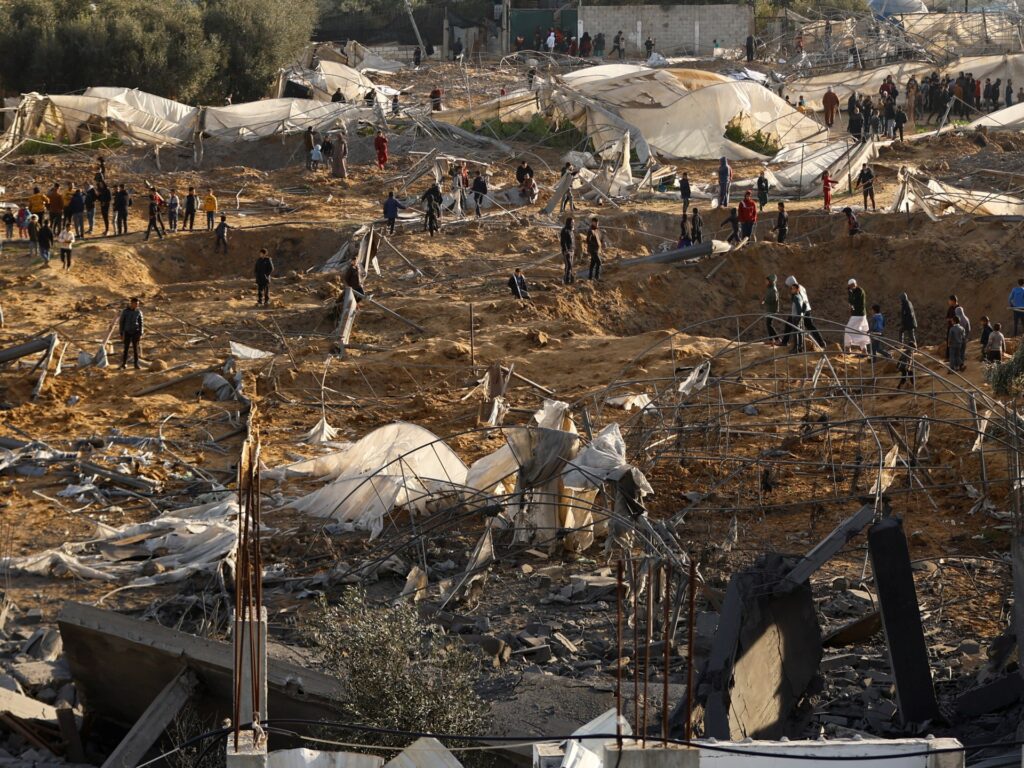The UN’s highest court notes a “perilous” situation but rejects South Africa’s request to order urgent measures to protect civilians.
The UN’s top court said it took note of the ‘perilous’ situation in the southern Gaza town of Rafah, but rejected South Africa’s request for urgent measures to protect threatened Palestinians by an Israeli ground attack there.
“The Court notes that the most recent developments in the Gaza Strip, and in Rafah in particular, would “exponentially worsen what is already a humanitarian nightmare with incalculable regional consequences”, as the Secretary-General of the United Nations”, declared the International Court. of Justice (ICJ), said Friday in a press release.
He said the situation in Rafah “requires the immediate and effective implementation of the provisional measures indicated by the Court in its order of January 26, 2024,” when it ordered Israel to take all measures in its power to ensure that acts of genocide are not committed in its territory. war against Gaza.
However, the court “does not require the indication of additional precautionary measures”, adds its press release.
PRESS RELEASE: the #ICJ issues its decision on the request for additional provisional measures presented by South Africa in the event of application of the Convention on the Prevention and Punishment of the Crime of Genocide in the Gaza Strip (#South Africa v. #Israel) pic.twitter.com/KLIMOD69uo
– CIJ_ICJ (@CIJ_ICJ) February 16, 2024
South Africa said on Tuesday it had filed an “urgent request” to the ICJ to examine whether Israeli military operations targeting Rafah violated interim orders the court issued last month in a case alleging genocide.
Israel on Thursday called on the court to reject the request, saying: “South Africa’s unjustifiable assertions clearly show that its request is not motivated by any change in circumstances and has no basis in fact or law.” »
“Grave violation” of the Genocide Convention
Israel’s war on Gaza has killed more than 28,000 Palestinians across the Strip, according to health authorities. The incessant bombings since October 7 have also led to the displacement of most of the population.
Around 1.4 million people are now sheltering in Rafah, on the border with Egypt, which Israel had initially designated as a “safe zone” for civilians.
But Israel is threatening to launch a ground invasion there, a move the U.N. and international governments — including Israel’s Western allies — have warned against.
South Africa’s urgent application to the court mentioned the hundreds of thousands of civilians stuck in Rafah, many of whom were fleeing “in accordance with Israeli military evacuation orders, from homes and areas that have been largely destroyed by Israel.” . They could now be directly threatened, according to the press release.
Israel’s unprecedented military offensive against Rafah would result in further large-scale killings, damage and destruction “in grave and irreparable violation” of the Genocide Convention and the ICJ ruling in late January, the request added.
In its statement on Friday, the ICJ said Israel “remains obligated to fully respect its obligations under the Genocide Convention and the said decree, including ensuring the safety and security of Palestinians in the Gaza Strip.”
Israel strongly denies committing genocide in Gaza. However, last month the ICJ declared itself competent to hear South Africa’s case against Israel, in which the latter is accused of violating the genocide convention.
The court ordered Israel to do everything in its power to prevent death, destruction and any acts of genocide in Gaza, but the panel of judges stopped short of ordering an end to the offensive military which ravaged the Palestinian enclave.

